pets
How to Choose a Pet That is Suitable for the Disabled
Choosing a pet can be a joyful and rewarding experience for anyone, but for individuals with disabilities, the process requires extra consideration. It's essential to select a pet that not only brings companionship and joy but also suits the specific needs and abilities of the disabled person. In this guide, we'll explore some key factors to keep in mind when choosing a pet for a disabled individual, along while discussing the best pets for disabled.
1. Consider the Physical Abilities of the Individual 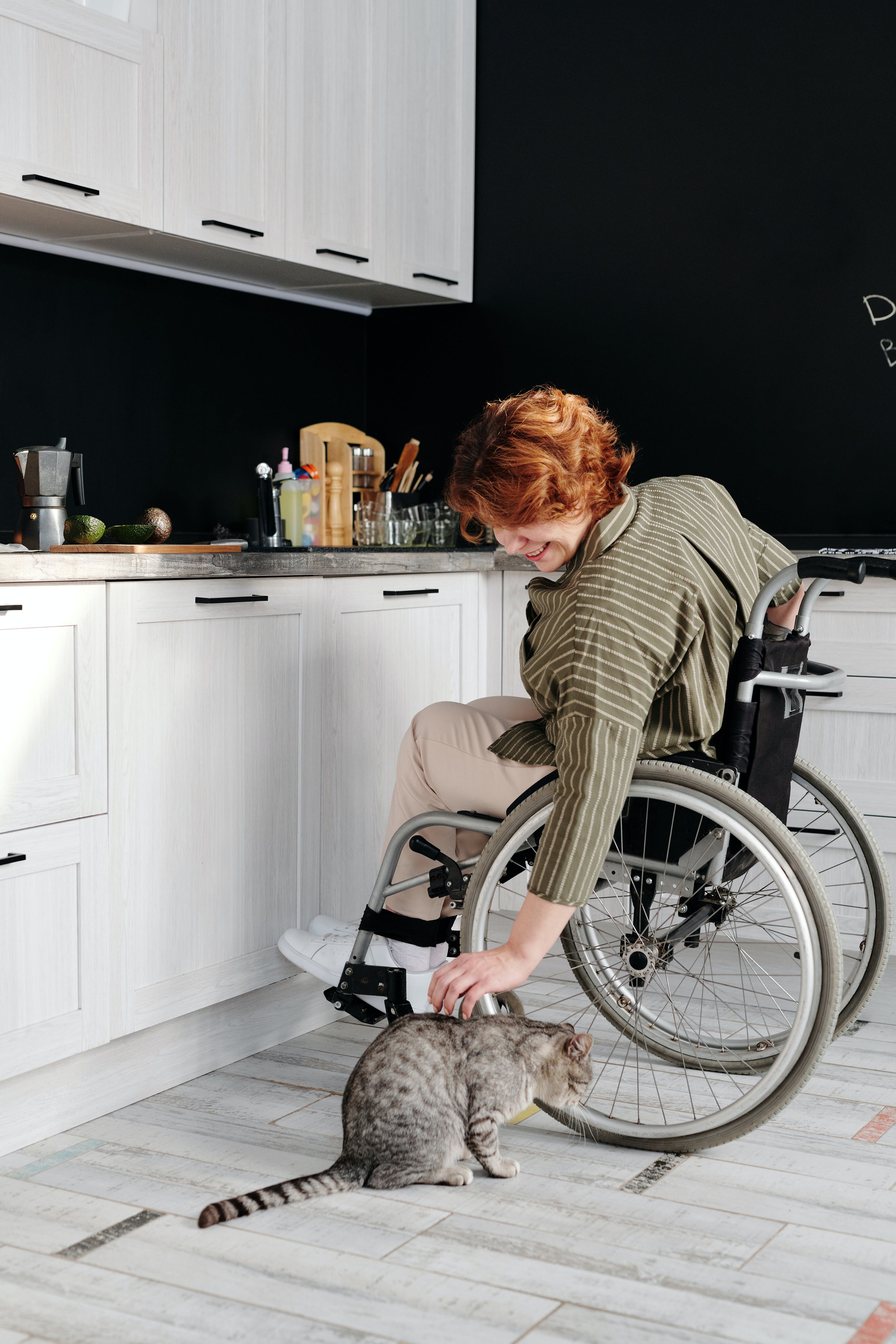
The first and most crucial step in choosing a pet for a disabled individual is to assess their physical abilities. Different disabilities have varying impacts on mobility and strength. For someone with limited mobility, a small and low-maintenance companion like a cat or a small dog may be a suitable choice. In contrast, individuals with more mobility may be able to care for larger dogs, which can offer both companionship and assistance.
2. Allergies and Sensitivities
People with disabilities might have allergies or sensitivities that can be triggered by pet dander, fur, or feathers. It's vital to consider these factors when choosing a pet. Hypoallergenic breeds or non-allergenic animals like reptiles and fish may be more appropriate for individuals with allergies or respiratory issues.
3. Energy Levels
The energy level of the pet should match the energy levels and abilities of the disabled person. High-energy dogs may be too demanding for someone with limited mobility. In such cases, consider lower-energy dog breeds or cats. Turtles, tortoises, or certain bird species can also be great options for people with a more laid-back lifestyle.
4. Training and Temperament
When choosing a pet for someone with a disability, it's important to consider the pet's temperament and its training requirements. Well-behaved, easy-to-train pets are often a better fit. Look for pets that are known for their gentle and patient nature, as these characteristics can make the pet-owner relationship more enjoyable and less stressful.
8. Financial Considerations
Owning a pet comes with financial responsibilities. It's important to consider the cost of food, veterinary care, grooming, and other pet-related expenses. Make sure that the individual or their support network can handle these costs comfortably. Although some health service providers can provide guide dogs which can assist you in areas of your disability.
6. Maintenance and Care
Consider the level of care and maintenance that the chosen pet will require. Disabled individuals might have varying levels of ability to care for their pets independently. Assess whether the individual can groom, feed, and clean up after the pet. If assistance is required, make sure there is a support system in place, with the Tenura product range we can help improve the maintenance for you and your companions with our range of daily living aids!
7. Housing and Space
Take into account the living situation of the disabled individual. Do they live in an apartment, a house, or a care facility? The available space will influence the choice of a pet. Smaller living spaces may be more suitable for cats, small dogs, or small mammals, whereas larger spaces can accommodate bigger dogs or even livestock in some cases.
8. Assistance Animals
Some disabled individuals require assistance animals to help with daily tasks. Service dogs, for instance, can be trained to perform tasks like fetching dropped items, opening doors, or providing emotional support. Ensure that you consult with a reputable service animal organisation to select and train a service dog that meets the specific needs of the disabled person.
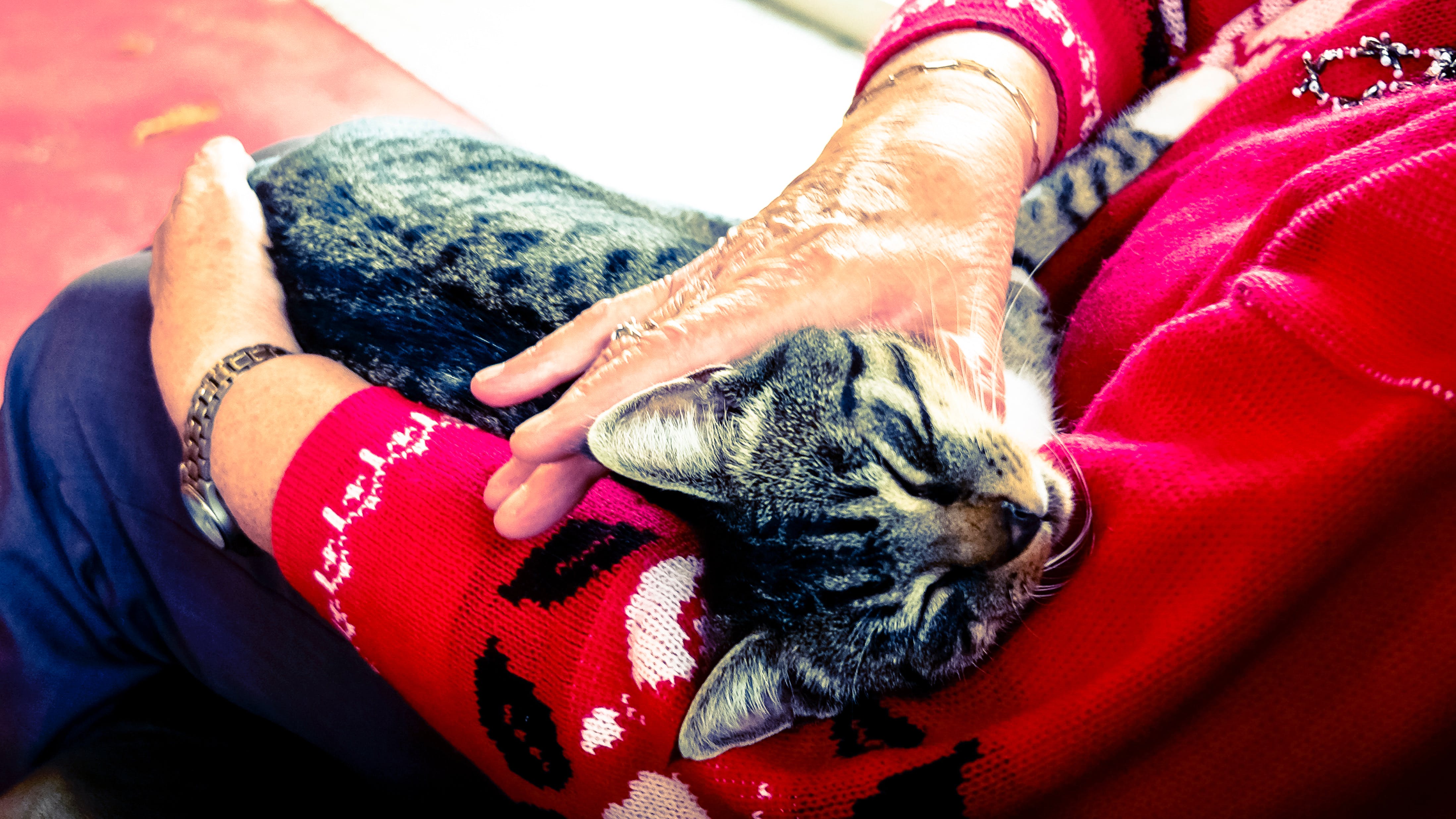
What Animals Can Be Used to Help The Disabled?
Cats and dogs are the most common animals used to assist people with disabilities. Dogs are highly versatile and can be trained to aid those with various disabilities, such as visual impairments, mobility challenges, and medical conditions like epilepsy or diabetes. Service dogs provide essential support by guiding their owners, retrieving items, and even alerting them to impending medical emergencies. Cats, although less commonly known as service animals, can offer valuable emotional support to individuals with disabilities. Their calming presence, companionship, and intuitive understanding of their owners' needs can be incredibly comforting. While dogs take on more active roles in assistance, cats excel in providing solace and emotional stability, making them essential companions for those with disabilities.
Can Animals Sense Disability?
Animals have a remarkable ability to sense disabilities in humans. Their acute senses and intuition enable them to detect physical and emotional changes in individuals. Many heartwarming stories and scientific studies have highlighted the incredible bond between animals and people with disabilities. Whether it's a service dog assisting someone with mobility challenges or a pet offering emotional support, these companions have an uncanny ability to understand and provide comfort to those in need. This unique connection between animals and individuals with disabilities is a testament to the profound sensitivity and empathy that our animal friends possess.
What Is The Best Dog Breed for Someone With a Disability?
When it comes to dog breeds for people with disabilities, several factors come into play. For individuals with mobility challenges, Labrador Retrievers, Golden Retrievers, and German Shepherds are often recommended as they are not only intelligent but also known for their gentle and helpful nature. However, the best dog breed ultimately depends on the specific needs and lifestyle of the disabled person. It's crucial to consult with a professional dog trainer or service dog organisation to make the right choice.
Choosing a pet for a disabled individual involves thoughtful consideration of their unique needs and abilities. The right pet can provide companionship, emotional support, and even assistance with daily tasks. By taking into account factors such as the individual's physical abilities, allergies, energy levels, temperament, and living situation, you can make a well-informed choice that will bring joy and fulfilment to both the person with a disability and their new furry or scaly friend. Learn more about animal therapy by reading our other blog.
If you're in need of daily living aids for a disabled individual, Tenura offers a range of high-quality products to improve daily life. To explore our offerings, please visit Tenura’s website.
Remember, the most crucial aspect of choosing a pet for someone with a disability is ensuring that the pet enhances their life, provides companionship, and supports their specific needs. Always consider the individual's comfort, safety, and happiness when making this important decision.
The Benefits of Disabled People Owning a Pet
 This blog post will explore the advantages both mentally and physically that owning a pet can have on someone with a disability such as arthritis.
This blog post will explore the advantages both mentally and physically that owning a pet can have on someone with a disability such as arthritis.
Having a disability can affect your everyday life, harming your heart rate, communication and causing depression. However, a furry companion like a cat or dog can help to reverse the negative impact.
Owning a pet positively influences two main aspects of life, mood and health, which means pets affect the body in terms of decreasing rates of depression, blood pressure and cholesterol levels. Let's explore these benefits in more detail…
Pets and Their Effect on Blood Pressure and Arthritis
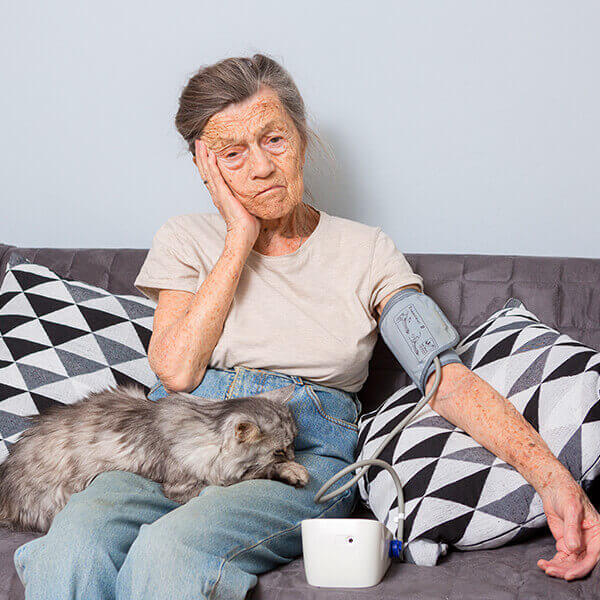 With arthritis, inflammation can occur in joints, constricting arteries and reducing the rate blood can flow through the body to supply muscles with oxygen. The restricted flow leads to increased blood pressure, which is troubling for arthritis patients as they are at a 50% higher risk of heart attacks.
With arthritis, inflammation can occur in joints, constricting arteries and reducing the rate blood can flow through the body to supply muscles with oxygen. The restricted flow leads to increased blood pressure, which is troubling for arthritis patients as they are at a 50% higher risk of heart attacks.
So, it's essential to reduce blood pressure, and pets can help. Pets have therapeutic calming auras. When a pet is in your lap, you talk, stroke and nestle into its warmth, forgetting your worries, which decreases your heart rate. When you are tired or nervous, it's nice to have a companion.
Pets can make a person feel safe in their home or when out and about; animals can be a security blanket, guard the person or their belongings, and be a protective barrier or conversation starter. Feeling safe and secure can also lower levels of anxiety and stress that heighten blood pressure.
Pets and Their Effect on Cholesterol Levels and Arthritis
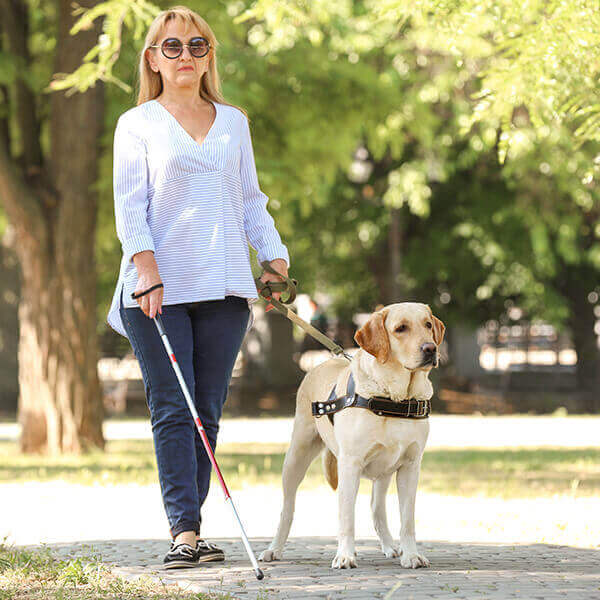 Those with rheumatoid arthritis are at high risk of heart disease, 50% to 70% higher, and cholesterol is a contributing factor. Having elevated cholesterol levels in the body increases pain within joints and other tendon complications.
Those with rheumatoid arthritis are at high risk of heart disease, 50% to 70% higher, and cholesterol is a contributing factor. Having elevated cholesterol levels in the body increases pain within joints and other tendon complications.
You may have high cholesterol levels due to long periods of stress, a lack of exercise or a poor diet containing too many saturated fats. Studies have shown that pets decrease the triglycerides present in the body. Triglycerides are the three fatty acids that contribute to high cholesterol levels.
Reducing cholesterol in the body can help keep heart disease at bay. To lower cholesterol levels, you should exercise daily for at least 30 minutes, and having a pet is an excellent excuse to go for a walk and is undoubtedly a great benefit. Having a pet with you can reduce the stress or anxiety you may feel when out walking.
Pets and Their Effect on Cognitive Behaviour/Depression
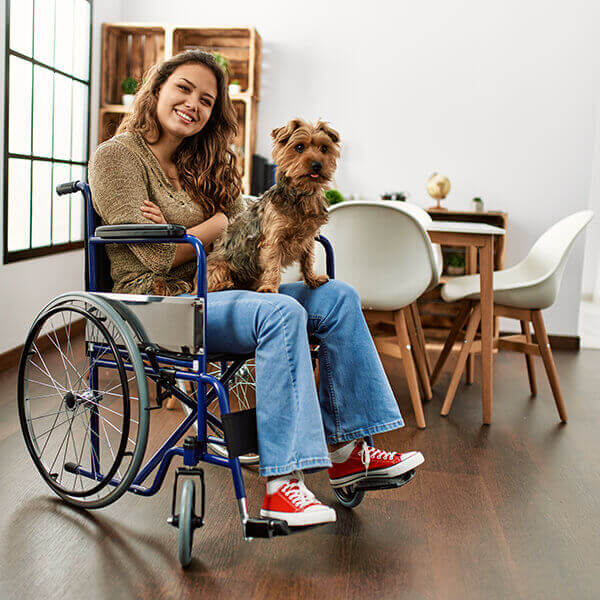 It's estimated that up to 41% of disabled adults have depression, which is staggeringly high, and there is no one cure to suit all. Many factors cause depression in a person's life, and it can be a struggle to help change a person's mindset.
It's estimated that up to 41% of disabled adults have depression, which is staggeringly high, and there is no one cure to suit all. Many factors cause depression in a person's life, and it can be a struggle to help change a person's mindset.
The companionship of a pet, a being they need to care for, can give a disabled person the necessary motivation and responsibility for a positive change. Caring for others can come more naturally than caring for yourself when struggling with depression, so an animal's natural temperament to play and exercise can have promising long-lasting effects on their mental state.
Pets Effect on the Elderly
Pet owners over 65 visit their doctor 30% fewer times than non-pet owners. There's no clear-cut reason, but the benefits of reduced stress, increased exercise, and companionship all help play their role.
Some Tenura Products that Make Pet Ownership Easier for the Disabled:
Tenura products can help those who have weak grip strength or conditions like arthritis care for their pets.
Tenura Extreme Grip Mats
When it comes to feeding your pet, they tend to be pretty eager, diving headfirst into their food bowl, knocking it around the floor, with no worry about the mess they create. You can prevent this previously inevitable mess by placing the pet's food bowl onto a Tenura Extreme mat. Tenura Extreme mats stop the food bowl from sliding across the floor or getting tipped over.
Nothing is sacred when you have a pet, they wonder where they please, and cats especially seem to find themselves upon the cabinets displaying your favourite ornaments. Instead of watching their next steps with fright, place your vases and such on a Tenura Extreme mat. The objects stick to Tenura mats, so the next time your cat is up there, you won't need to worry nor tidy up anything broken. ![]()
Tenura Grip Roll
You can line underneath pet products such as litter trays, scratching posts and other large products that unwantedly move. Just cut Tenura silicone grip roll to size and place it between the floor and pet accessory.
Tenura Grip Strips
During walks, you may find that the lead is tricky to keep a hold of, and it's uncomfortable. You can instantly improve these issues by twisting Tenura grip strips around the lead's handle. Grip strips add a layer of cushioning silicone comfort with grip-enhancing properties that stops the lead from sliding out of your hand.
Similarly, you may wrap Tenura grip strips around the brushes handle when grooming your pet, which aids your grip, giving you more control. Brush handles can be thin and difficult to grasp, so build up a few layers of Tenura grip strips to increase the handle's width, which is a helpful idea for those with arthritis or other conditions that limit dexterity or strength of grip.
Extensive research into the animal should be completed before being housed, as not all animals/breeds will be appropriate. It's very much dependent on the person's specific disability needs.
Subscribe to be notified of new blogs and our latest offers. You get a 10% off code when you subscribe today!
